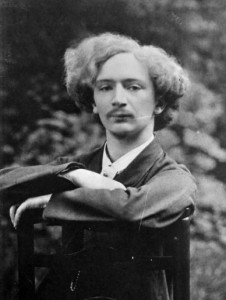 Born in London in 1837, Algernon Swinburne became one of the most well-known poets of the Victorian age, producing verse that often shocked and shook the morals of the conservative elite of the city. The oldest of 6 children in a wealthy family, he was sent to Eton to begin his studies where he discovered his love of poetry and began to write.
Born in London in 1837, Algernon Swinburne became one of the most well-known poets of the Victorian age, producing verse that often shocked and shook the morals of the conservative elite of the city. The oldest of 6 children in a wealthy family, he was sent to Eton to begin his studies where he discovered his love of poetry and began to write.
At Oxford he was temporarily expelled and, although he returned to complete his studies, he never actually received his university degree. In his heart, Algernon Swinburne believed he belonged to his family home of Northumberland and would write long lyric poems in praise of the countryside. He was prone to over indulging in drink, and spent some time in France recovering from his alcoholic excesses in 1861.
When he was well enough, he traveled to Italy where he made the acquaintance of writers such as Dante Gabriel Rossetti. His first work was published in 1860 but received little or no reaction from the general public or critics. His success came in 1865 when he wrote Atalanta in Claydon, created to mirror the form of a Greek epic tragedy.
More notable was the publication of Poems and Ballads in the year following, a collection that earned him a fair deal of infamy with its themes that were perceived to be indecent at the time. His poem Anactoria contained mentions of sadomasochism and cannibalism and was typical of some of the areas he explored.

Although he is often remembered for his notorious verse and lascivious themes, Swinburne actually wrote a wide range of poetry. He was also an innovator, creating a new form of verse called the roundel, which contained repeated refrains in a certain, stylistic pattern. His collection Songs Before Sunrise, published in 1871, was largely political and militant, supporting an Italian movement that was striving for unity.
Throughout his life he suffered from bouts of sickness and may well have been an epileptic. His drinking was never fully controlled and on occasion made him very ill. His reputation never took off as he expected after the publication of Poems and Ballads and he drank heavily in the ensuing years. In 1879, he was taken in by his long-time friend Theodore Watts-Dunton who tried to nurse him back to health.
Refusing Swinburne access to his friends and controlling his money, Watts-Dunton, though using draconian measures, is credited with saving that poets life at the time.
Swinburne is often more remembered for his strong technical expertise than the subject matter of his poems. He is thought to outclass the likes of Tennyson in that respect though is often not considered to match the emotional range of the higher poets and writers. His last collection A Channel Passage demonstrated his move away from the infamy of his earlier work and included the poem The Lake of Gaube.

Algernon Swinburne continued to write for the rest of his life, given a second chance by his friend Watts-Dunton. He eventually passed away at the age of 72 in 1909. He is buried at Bonchurch in the Isle of White.

